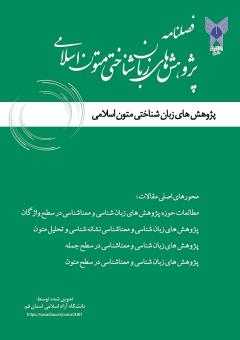تحلیل معناشناختی استعاره «قلب سلیم» در قرآن کریم و تطبیق آن با سلامت روان
محورهای موضوعی : پژوهشهای زبان شناختی و معنا شناسی در سطح واژگان
1 - استادیار، گروه روانشناسی و مشاوره، واحد قم، دانشگاه آزاد اسلامی، قم، ایران.
کلید واژه: قلب سلیم, قرآن, سلامت روان.,
چکیده مقاله :
هدف اصلی پژوهش حاضر مقایسۀ تطبیقی استعارۀ قلب سلیم و نسبت آن با سلامت روان است. پرسش اصلی پژوهش آن است که آیا معنای اصطلاح «قلب سلیم» مترادف با «اختلالات روانی» است؟ روش پژوهش مطالعه کتابخانهای و تفسیری بوده و نتایج نشان داد که در فرهنگهای ایرانی، عبری، رومی، یونانی و اعراب پیش از اسلام، قلب مرکز احساسات تلقی میشده و تنها با ظهور اسلام، قلب به عنوان مرکزی برای شناخت وارد فرهنگ اعراب شده و بر کارکرد آن افزوده شده است. در نوعی دیگر از بررسیها روش همنشینی و جانشینی نشان داد که مقصود اصلی قرآن از نام بردن قلب با سایر ابزارهای احساس مادّی همچون سمع و صدر و فؤاد، کاملاً جنبۀ مجازی داشته و مقصود نوعی درک عقلانی و احساسی باطنی و غیرمادّی است. نمیتوان «قلب سلیم» را مترادف با «سلامت روان» دانست؛ همچنان که نباید «مرض قلب» ناشی از گناهان مورد اشاره در قرآن را با «اختلال روانی» مترادف دانست؛ چراکه از یکسو در تحقق قلب مریض عنصر تعمّد و اختیار، نقش مهمی را ایفا میکند و این در حالی است که بسیاری از اختلالات روانی نتیجۀ تحقق گناهان نبوده و اختیار یا حداقل تعمّدی در تحقق آنها نبوده و تنها برخی از آنها نتیجۀ ضعف مرتبۀ ایمان فرد بوده و بسیاری از اختلالات روانی هم با منشاء بدنی صورت میگیرد که بالطبع ارتباطی با گناه ندارد. در نتیجه، به دلیل وجود موارد نقض فراوان، تفسیر مفهوم «قلب سلیم» به اصطلاح روانشناختی «سلامت روانی» خطاآمیز است و باید از آن اجتناب نمود و هر کدام از اصطلاحات مورد اشاره را باید صرفاً در حیطۀ همان علم مورد استفاده قرار داد.
The main aim of this research is to conduct a comparative analysis of the metaphor Qalb Salīm (sound heart) and its relation to mental health. The primary question is whether the term Qalb Salīm is synonymous with "mental disorders." The research methodology is based on a library-based study and interpretative analysis. The findings indicate that in Iranian, Hebrew, Roman, Greek, and pre-Islamic Arab cultures, the heart was considered the center of emotions. However, with the advent of Islam, the heart was introduced as a center for cognition in Arab culture, thus expanding its function. In another type of analysis, the collocation and substitution method revealed that the Quran's mention of the heart alongside other sensory tools such as samʿ (hearing), ṣadr (chest), and fuʾād (intellect) is entirely metaphorical, implying a form of rational and emotional inner, non-material understanding. Qalb Salīm cannot be equated with "mental health," just as Maraz al-Qalb (disease of the heart) due to sins, as mentioned in the Quran, cannot be equated with "mental disorder." This is because, on the one hand, the realization of a diseased heart involves an element of intent and choice, while many mental disorders are not the result of sins and do not involve intention, or at least deliberateness, in their occurrence. Moreover, many mental disorders stem from physical causes that are unrelated to sin. As a result, due to the numerous inconsistencies, interpreting the concept of Qalb Salīm as the psychological term "mental health" is erroneous and should be avoided. Each term should be used exclusively within the scope of its respective discipline.


